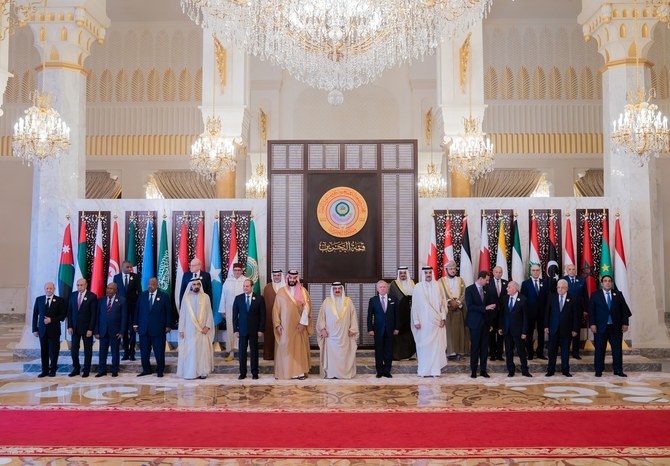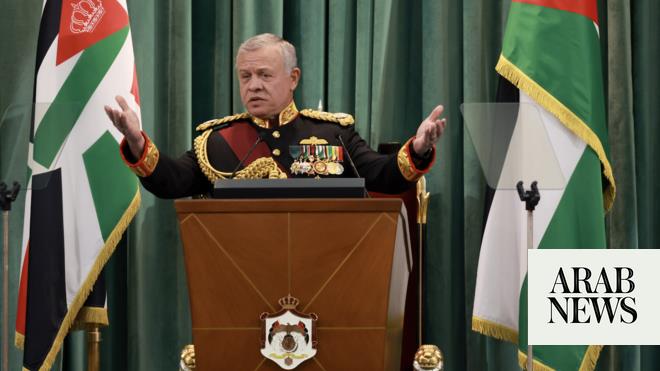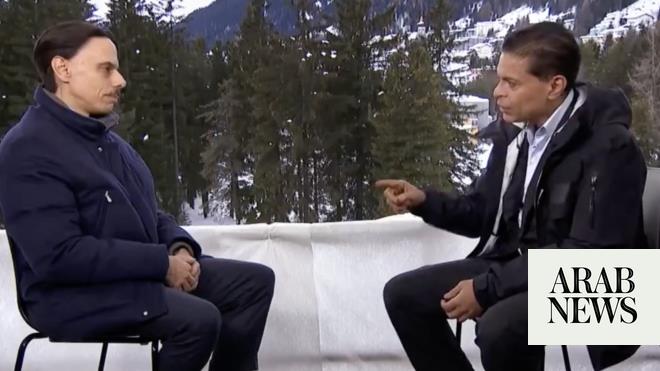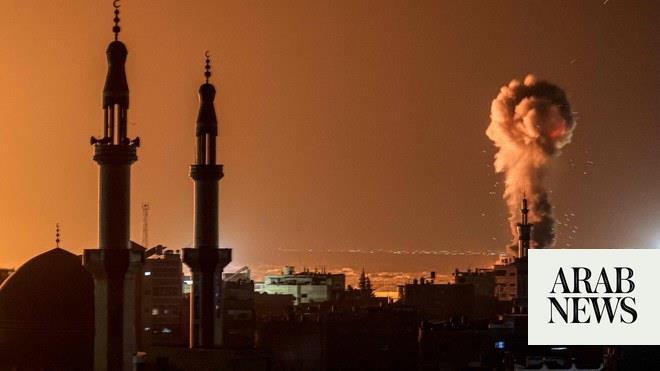
Whether in US campuses, Western capitals or Arab streets, we have been swamped with overheated rhetoric about the Gaza situation — with very little done in practice to ameliorate the situation. That is why last week’s Manama Arab League Summit represented a victory for reason over rhetoric — a united effort by Arab states to exploit their combined weight to wield a constructive influence upon the current catastrophic situation.
Consequently, the unanimously agreed Manama Declaration represented a gesture of intent by the bloc of Arab nations, including the demand for an immediate ceasefire and a role for international troops to protect Gazan civilians; the implementation of a two-state solution; unification of Palestinian factions; and a halt to attacks on Red Sea shipping. The communique also called for “an immediate and sustainable ceasefire” in Sudan, as well as addressing a multitude of other regional challenges.
Opening the conference, Crown Prince Mohammed bin Salman reiterated Saudi Arabia and the Arab League’s long-standing position of advocating “a just and comprehensive solution to the Palestinian issue based on UN legitimate resolutions and the Arab Peace Initiative.” Bahrain’s King Hamad bin Isa Al-Khalifa demanded “full recognition of the state of Palestine” and led the call for “an international conference under the auspices of the United Nations to resolve the Palestinian issue based on the two-state solution,” hosted by Bahrain, which holds the Arab League presidency over the coming year.
Youthful leaders constructively exploited the event for a plethora of discussions on the full spectrum of crucial issues
Baria Alamuddin
Speaking from Manama, UN Secretary-General Antonio Guterres described the Gaza conflict as “an open wound that threatens to infect the entire region,” while stressing that “the only permanent way to end the cycle of violence and instability is through a two-state solution.” This comes in a context where multiple European states, such as Ireland, Spain, Greece, Norway and Slovenia, are considering the immediate recognition of Palestine as a sovereign, independent state.
Emphasizing progress toward the recognition of a Palestinian state, Arab League Secretary-General Ahmed Aboul Gheit noted how dramatically “the compass of international public opinion has shifted,” while denouncing Israel’s “violations as nothing short of ethnic cleansing.” King Abdullah of Jordan urged the world to “shoulder its moral and humanitarian responsibility to end an ongoing conflict that is over seven decades old.”
The 33rd Arab Summit was the first such event since the eruption of hostilities in Gaza, with participation by all key expected leadership figures and a record 20 foreign ministers. It was also the first time that the Kingdom of Bahrain had hosted an Arab League summit. The event ran like clockwork, including regarding the pragmatic manner in which youthful leaders and officials constructively exploited the event for a plethora of side meetings and discussions on the full spectrum of crucial issues. As one of the attendees, it struck me that a major factor in the successful dynamics of this summit was its being hosted on the islands of Bahrain; the tranquil environment facilitating productive dialogue concerning highly emotive and traumatic issues.
In the event’s corridors, there were fertile debates over the Gaza issue — between audience members who supported the Oct. 7 attack and those who viewed it as bringing about a disaster for Palestinian civilians, while questioning Hamas’ motives. Many attendees expressed anger at the manner in which the US and multiple European states had reflexively supported Israel, while expressing concern at the polarized situation between global powers, particularly in the context of the Ukraine war, which contributed to the closing off of international mechanisms for conflict resolution and led to geopolitical paralysis.
Among attendees, frustration was repeatedly expressed toward entities like Hamas, Hezbollah and the Houthis
Baria Alamuddin
Among attendees, frustration was likewise repeatedly expressed toward entities like Hamas, Hezbollah and the Houthis, whose rhetoric and use of violence have gratuitously inflamed the situation. There was particular concern at how Jordan was being destabilized by pro-Iran militias trying to flood the country with arms and narcotics, using Gaza as a pretext. Palestinian President Mahmoud Abbas furthermore criticized Hamas for giving Israel the “pretext” to attack Gaza, while calling on regional states to “activate the Arab safety net” in implementing programs of practical support for Palestinians.
Even the attendance of Bashar Assad failed to act as a significant spoiler, particularly as he abandoned his planned delivery of a speech at the last minute; likely a tacit recognition that his pledges to Arab leaders — such as cracking down on the narcotics trade, distancing himself from Iran, facilitating the safe return of refugees and normalizing the Syrian domestic environment — had not come to fruition.
Among the Manama Declaration’s many priorities were providing educational services and improving healthcare for those affected by conflicts in the region. These are hugely important aspirations in a region plagued by wars, where millions of children have not been granted regular access to schooling or where those with life-changing medical challenges have no recourse to assistance. In particular, we think of thousands of orphans in Gaza who have not only lost entire families, but also have to cope with the loss of limbs and little prospect of a meaningful future.
Nobody expects the Manama Declaration to change everything overnight. But it does provide an important framework for lobbying Western diplomats, providing funding for educational and health initiatives and compelling Israel to acknowledge that, if it desires a meaningful and comprehensive peace with regional states, the facilitation of a sovereign Palestinian state is paramount.
Past Arab League summits have often offered little to meet the aspirations of Arab citizens. However, Bahrain has a distinguished record in bringing different faiths and cultures together and brokering understanding and agreement. Now it is more crucial than ever that leaderships energetically follow through on the promises and ambitions of the Manama Declaration in pursuit of peace for Palestine and the region.
Baria Alamuddin is an award-winning journalist and broadcaster in the Middle East and the UK. She is editor of the Media Services Syndicate and has interviewed numerous heads of state.












